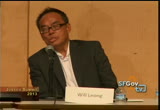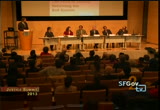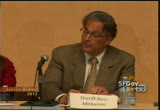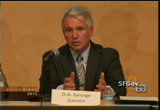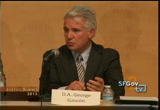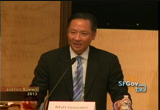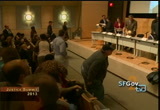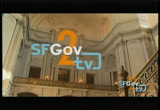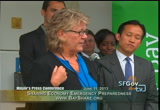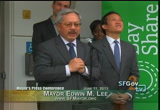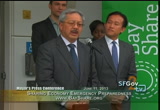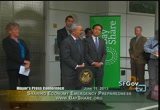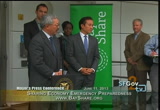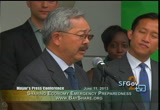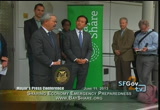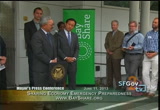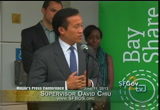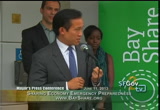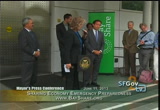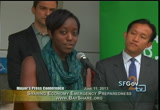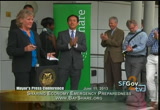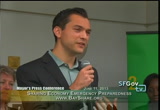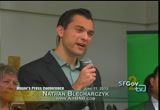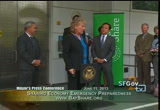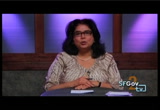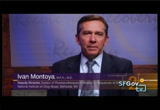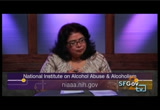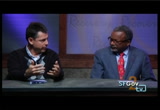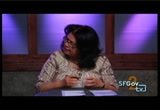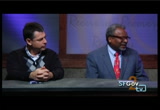tv [untitled] June 25, 2013 4:00am-4:31am PDT
4:00 am
been common. traditionally cases that the court is looking for supervision, but again as you might imagine the resources are severely taxed. and during the budget difficulties in the last years, the ability to manage large numbers. we are talking for example, homeless individuals, we see 30 individuals at any one given time. that's the active case load and it's driven by that. >> i have a question from the public defender for the law enforcement officials here. what reforms can you commit to at this point to reduce pretrial detention population? shall we start with sheriff mirkarimi or the district attorney? >> i will reiterate that the strategy that i think san
4:01 am
francisco should seriously consider legislate a new criteria. that's what the penal code has empowered us to do. we could start right away by corralling a number of legislators and city hall to get behind this effort completely. and i suggest budgetary wise pretrial as will represents is not funded enough. frankly. and our ability to i think really discharge in a supervised capacity so there is an alternative to incarceration is something that the city should put on a higher pecking order. since it costs about $50,000 a year to incarcerate somebody. when i look at the collaborative court models. when we look at the pretrial
4:02 am
supervisory models we are talking about here. they are really a fraction of the cost. and i don't think we have that on system down as fluidly we would like, i think many of these are eligible for that program. and that requires pretrial to staff and have expanded population. >> george, we will give you the last word, we are pretty much at our time. >> we are underway, the reality that several of us here are members of the sensoring commission, including our public defender, mrs. mccracken and sheriff mirkarimi and myself. and this is an effort that started last year, the goal is a two-year process to look for sentencing reform and looking at best practices to determine what is appropriate. and certainly pretrial detention
4:03 am
is part of the mix. i go back to what i said earlier, i believe that pretrial custody should be based on appropriate -- and i want to underline appropriate, risk assessment tools. that will be race neutral. that will be gender neutral. that will be socially neutral. but assess risk, risk of violence, risk of not showing up for court. i believe that, that is an achievable goal. and i believe that the sentencing commission is a really good place. we have excellent resources at our disposal. we have a two-year plan. and we have basically every component of the general system and the community in this process. i hope we will come up with a pretrial releasing process. >> i want to thank all panelists for participating. and thank you all for attending.
4:04 am
[applause] i think our public defender will make some closing remarks. >> in closing i want to thank all of you for attending this year's justice summit. as you heard we have many challeng challenges in areas to improve upon. we look for your support. we will continue through this year, and for more information about the gideon case or activities in your area, visit gideonslegacy.org. and we be posting more information on our website. and ask the public defender
4:05 am
through this year. and i want to invite you a special event on may 9, sister helen rajeem will be here, and she's well known and played in deadman walking. that's may 9. i want to thank all volunteers and those who made this event possible. and all of you for attending. thank you and have a good evening.
4:06 am
4:07 am
i'm here dem, our role is really to prepare for large disasters, the disasters that happen every day, too. i'm very excited today to present a new idea that the sharing community in san francisco has come up to partner with us in preparing for disasters and in responding to and recovering quickly. last month we had a very good drill mimicking a 7.8 earthquake. we fed 6,000 people in the tenderloin with no electricity. we had set up a shelter up at st. mark's. it was just an incredible day. and that's what working with our community partners with the faith-based community and with the sharing community. ~ so, when mayor lee came to us about six months ago with this idea to partner with the sharing community, we were very
4:08 am
excited and we said yes. we had our first meeting, first of many figuring out how we can build a platform together to make it very simple for our residents in san francisco to be able to get the resources they need and to be able to connect in a disaster using the tools that already exist in the platform. so, on that note i'm going to introduce mayor ed lee who knows disasters like no one else. he is the biggest supporter of our preparedness in san francisco and it's an honor to work for you, mr. mayor. >> thank you. thank you, ann. good morning, everybody. the good news this morning is that there's no city-wide disaster. but we take this opportunity to remind ourselves that everything that we can do ahead of time to better prepare for disaster is going to be incredibly beneficial to our residents, to our small businesses, even to our major
4:09 am
businesses. and, so, i have been very glad to have been working with board president david chiu to be working on the working group that as we review and understand what these new companies are doing, the technologically oriented companies that are part of a share economy, get more people involved in the economy in general, and creating ideas about how people can participate. we came across a very great idea that as we go through more exercises in our disaster preparedness, ann and her staff have been great at that. in fact, the last one i kind of had fun in, how do we feed 10,000 people in the middle of the tenderloin in a major erredthtion quake disaster. we walked through that. we saw how meals are served. we tried to do it in the proper way. ~ earthquake we know we're going to need a lot of help. the main message that we wanted to have was after a disaster hits, we want the message to be
4:10 am
out before disaster, during a disaster, and right after, that we welcome everybody to participate in our recovery. and the best way to recover quickly and faster is we engage everybody immediately about how we can help and assist each other. and that's partly a philosophy of the sharing economy as well. and whether it's a need for space, people need to have space as they did in the aftermath of hurricane sandy, or now in oklahoma, or whether they needed to get a car because their car was damaged, or they needed some repairs in their house, they're trying to relight the pilot in the stove and they didn't know how to do it. they can't find the big utilities enthralled in a great effort elsewhere. these sorts of things people can help each other and we can access the companies that are part of bay share and the share economy to get some help for people right away. it's all in the general effort
4:11 am
that i want people of san francisco in every single neighborhood to know we want them here as part of the recovery, that they're not going elsewhere, we're not leaving them alone. we're not leaving them isolated. i learned that big lesson as myself and others who went with me to new orleans a few years back a couple years after their levees broke. we tried to understand the frustration of people in the ninth ward, and we kept getting these testimonies. local government and the businesses didn't ask us to come back. they didn't register a note for us to want to recover with them immediately. i want that to be a philosophy that is so strong, not only with our inter faith community, but also with our businesses, with our residents. and so, we're tasking up for that already with dem's leadership by saying that companies who have already
4:12 am
figured outweighs to share in the economy can also join us in the planning ~ of what we can do to bring residents back quicker. and if it means, like i read this morning, somebody who wants to donate mattresses to fire victims or any disaster victims in the city, they have that ability to do that through a website. my job is going to be to make sure we have the power on and the big stuff happening so that our companies can help us. so, we're figuring that out through the life lines council, working with all the utilities and sharing information there. but today was about bringing companies, whether they're task rapid or air b and b or the car sharing companies together with us and not only brain storm, but plan for the event so we're already have the task -- we can practice that. we can actually practice this today and involve neighborhoods through s.f. car, all the
4:13 am
wonderful programs that dem has set up, we can actually practice the sharing economy after an event happens today. and i think that will get people not only expecting to be here, wanting to be here, but know that they'll have help to be here, help on the ground, help in their small businesses, help in their neighborhoods. so, this is what bay share's operation and work with dem is going to be all about. this is why we have decided to welcome them onto the disaster council so that they can work with us on an ongoing basis, work with all the other utilities, bring our small businesses into action in a major disaster. and we're already seeing those efforts across the country when air b and b experimented what they can do to help people find some space with all of their memberships. they immediately said, we've got to turn the fee side off of the website. we've got to get people going. people wanted to help. they actually wanted to help.
4:14 am
and for the kind of philanthropic spirit we have in san francisco and the bay area, i think there will be a lot of people that want to help. they just need to have that medium to be able to connect up. so, working with bay share, we decided it's got to be one port at for that to happen so that you're not looking for different companies and what they're expert in. you just have to go to one portal, through the dem process, and we'll set that all up. and then you can access different tasks that people are willing to help you out on. i think this is incredibly helpful to us to have more people involved on the front end of preparing for disaster so they can help the city recover quickly. this has been a philosophy that i have wanted to have in this city. i'm so proud of our dem and our bay share groups that come together today with all the other people who have been committed for many, many years, helping us even improve in what we do, we know we're going to be there for each other. we'll be there with resources, with skill sets, and with even a higher level of appreciation
4:15 am
for everybody. so, great announcement. thank you to bay share and all the members for coming together to be with us and for your work on an ongoing basis to help the city prepare for disaster, recover quickly, and invite all the residents of the city to be part of it. thank you. (applause) >> thank you, mr. mayor. now it's my pleasure to introduce president david chiu who would like to say a few words. >> thank you so much. good morning. this announcement today is about how we best prepare being ground zero. ground zero in a number of meanings. first of all, san francisco, we are ground zero when it comes to emergency preparedness. i want to thank the department of emergency management and all of the folks who as a community ensure that just as we had to recover after the 1906 fire just as we recovered after loma-prieta in 1989, we know that the big one will hit us with a certainty over the next 30 years and we have to be prepared. but san francisco is also
4:16 am
ground zero for another wonderful phenomenon, and that is the sharing economy, the collaborative consumption movement that many of the folks here represent. i want to thank those of you who are innovating, thinking about how can we better use resources, how can we better share services, how can we ensure our housing, our transit, our tasks a shared among each other to maximize benefits for all our local communities. today obviously we are merging these two things, emergency preparedness and shared economy. mayor mentioned hurricane katrina. before i became a supervisor i spent nine years running a technology company. a few years after hurricane katrina, i was asked with a national team to go visit new orleans to figure out what we needed to do to get literally hundreds of websites up for nonprofit and city agencies that were looking to provide help. and at that time it took us months longer than it needed to do for recoveries that still years later have not yet come to be. and from our perspective,
4:17 am
today's announcement is really about how we take those months and years and compress them into hours and days. the fact that on top of our emergency preparedness, on top of our local volunteers and i want to thank our churches, i want to thank our nert volunteers, community members who are already prepared what we need to do when the next big one hits. account fact we are layering on top of our emergency innovators to think today how we prepare for the future, i've been excited about, gratified to work with mayor leon our sharable economy working group. this is one of the outputs of that. and i look forward to many, many ways in which our community will learn how to share both before and after the next big one hits us. thank you very much. (applause) >> thank you, president chiu. milicent johnson is the leader of bay share and she's going to tell us a few things about bay share and how it came together. >> bay share is so thrilled to
4:18 am
have the first of this kind partnership, to work with the city, and to really pitch in to help our hometown, the bay area, become stronger and more resilient. bay share is a collection of companies and stakeholders in the sharing economy who see the value of coming together, to pitch in, to start initiatives, to be a resource, and to collaborate with our city officials and our communities to help build a stronger community. a more connected community is a more resilient community, and communities that are connected are communities that share. and, so, it's a natural partnership and a natural collaboration for us to work with our cities and the bay area to help build a stronger community. we are incredibly excited for our users to engage in department of emergency
4:19 am
management initiatives. we are powered by the citizens of the bay area. whether they share cars, the city car share, or get around, share space through liquid space or para soma, or air b & b, or share stuff through yerdal, those are the people that come together and help each other in good times. those are the same people that are going to come together and help each other in disasters. and, so, we have a bunch of bay share members that are here and they have ideas for how they want to work with different city departments and want to pitch in to help create a stronger bay area. our next speaker is actually going to give you a concrete example of one of our member really stepping up to the plate and helping to create a stronger bay area. thank you so much. (applause) >> thank you, milicent. next we have nate blajarzek, co-founder of air b & b.
4:20 am
>> it was november of this past year when super storm sandy hit new york. it was an unprecedented event for the region. and in the midst of this disaster, we were really inspired by something we saw within our own community on air b & b. users of the air b & b platform were updating their profiles to say if you're a new yorker and you need a place to stay tonight, i'll take you into my home, no money. and we started seeing this, and we were really inspired. and we asked ourselves, what can we do to promote this further? and so over the next couple days we sent e-mails to our community, encouraging others to open up their homes. and we fundamentally changed how our system worked. we did away with the concept of payments so people could open their homes for free. we did away with our service fees and we created a landing page to organize information and get the word out about what
4:21 am
was available to those in need. and through those efforts, after several days, over 1400 homes were made available free of charge to the citizens of new york city. and looking back on that, we did a lot of good, but it also took a lot of work to organize. and i think if we had been a little bit more prepared, we could have done so much more. and, so, that's what today has been about, is starting a conversation with air b & b and the other members of the sharing economy about how can we do some proactive thinking about leveraging the greater community to help come together and be organized in a time of need. for air b & b, we've taken that functionally it that we developed for hurricane sandy and we made it such we can deploy it next time within 30 minutes, whether it be here in san francisco or anywhere else around the world, to rally, to
4:22 am
rally support and provide services. and, so, in closing i just want to thank our city leaders, mayor lee, president chiu, the department of emergency management, the bay share and the sharing economy companies for getting this dialogue started so that we're ready when it's needed. thank you. (applause) >> thank you, nate. and thank you all for coming. this has been a great day today. we are going to get -- go back into our meeting and continue our dialogue, but mayor lee and president chiu and i believe nate and milicent also will be here to answer a few questions if you would like to. so, thank you all for coming. (applause)
30 Views
IN COLLECTIONS
SFGTV2: San Francisco Government Television Television Archive
Television Archive  Television Archive News Search Service
Television Archive News Search Service 
Uploaded by TV Archive on

 Live Music Archive
Live Music Archive Librivox Free Audio
Librivox Free Audio Metropolitan Museum
Metropolitan Museum Cleveland Museum of Art
Cleveland Museum of Art Internet Arcade
Internet Arcade Console Living Room
Console Living Room Books to Borrow
Books to Borrow Open Library
Open Library TV News
TV News Understanding 9/11
Understanding 9/11